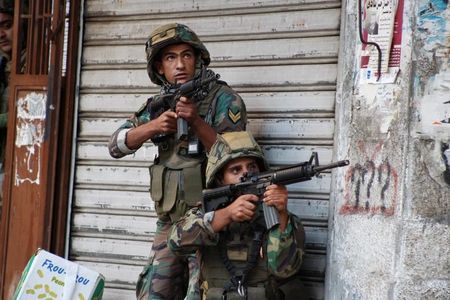BEIRUT (Reuters) - Lebanese soldiers battled Islamist gunmen in the country's north for a third day on Sunday, in some of the worst fighting to break out since fighters linked to Syria's civil war briefly seized a border town over the summer.
Security forces carried out raids in the northern city of Tripoli and near the town of Bahneen, where they seized dozens of explosives as well as three car bombs which were ready to detonate, security sources said.
Six soldiers, two civilians and at least nine militants have been killed since the fighting broke out on Friday, according to the sources.
The exact affiliations of all the fighters taking part in the clashes has been difficult to verify but the sources said they included both Lebanese and Syrian militants tied or sympathetic to the Islamic State group and al Qaeda's Syrian wing, the Nusra Front.
On Sunday the focus of clashes in Tripoli moved from the Old City, where militants had previously holed up, to the majority Sunni neighbourhood of Bab al-Tabbaneh.
Lebanon's National News Agency said that the army had also entered and taken "complete control" of the northern town of al-Minya, near where an attack on Saturday killed an officer.
Security sources said the military fired machine guns from helicopters against militants near the northern town of Bahneen. Rockets were fired from helicopters in the same area on Saturday, the first time the army has used such an attack against militants since Syria's war began.
Tripoli has long been a stronghold for hardline Sunni Muslim Islamists who have accused Lebanon's army of working with the Shi'ite movement Hezbollah, which has sent fighters to aid Syrian President Bashar al-Assad against Sunni rebels.
Tensions have been high in Lebanon since Islamist militants briefly seized the border town of Arsal in August, killing around 20 Lebanese soldiers and taking over 30 security forces members captive.

Also on Saturday two rockets fell near the Shi'ite town of al-Labweh in the Bekaa Valley downhill from Arsal.
(Writing by Alexander Dziadosz; Editing by Greg Mahlich)
